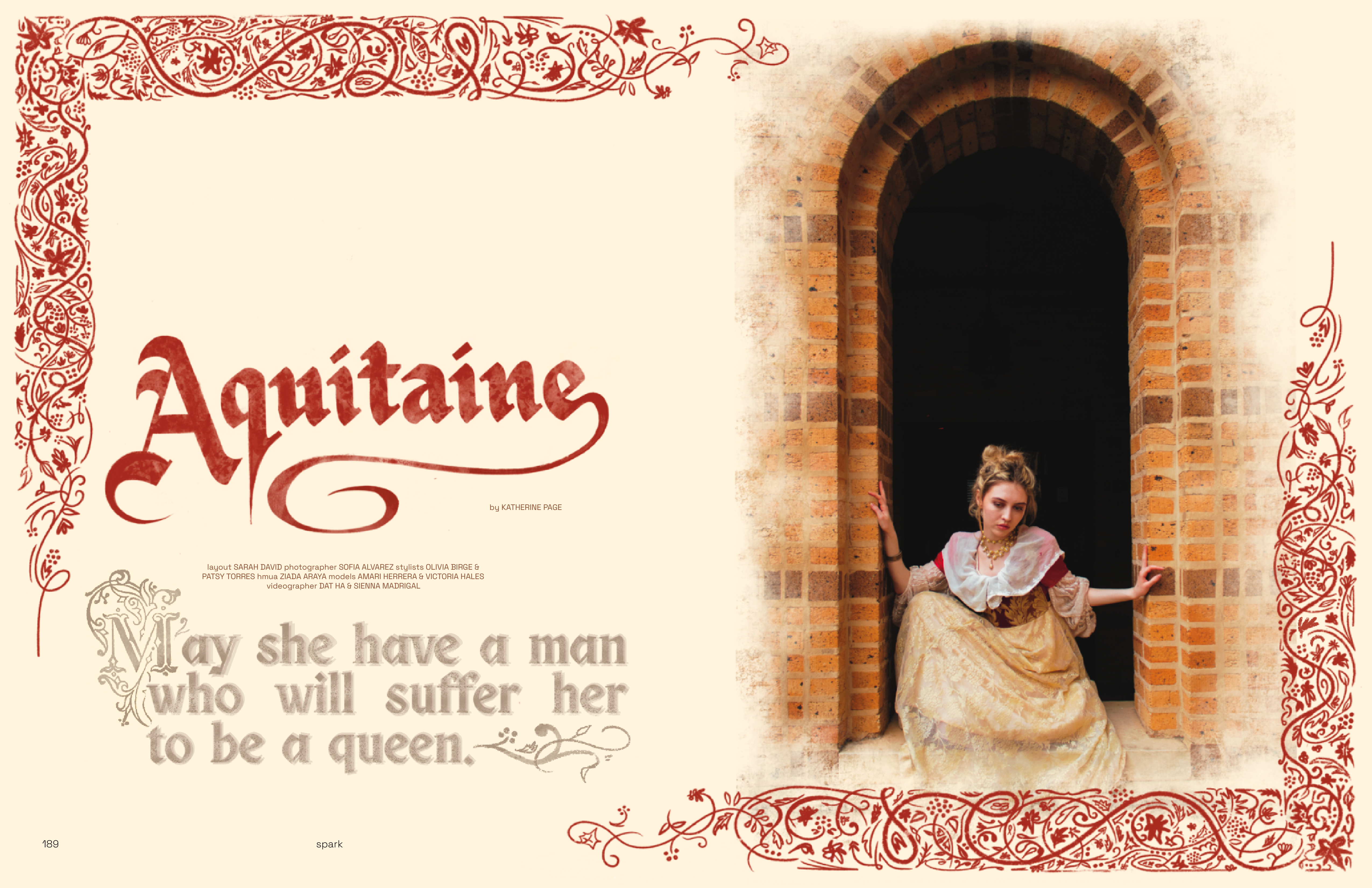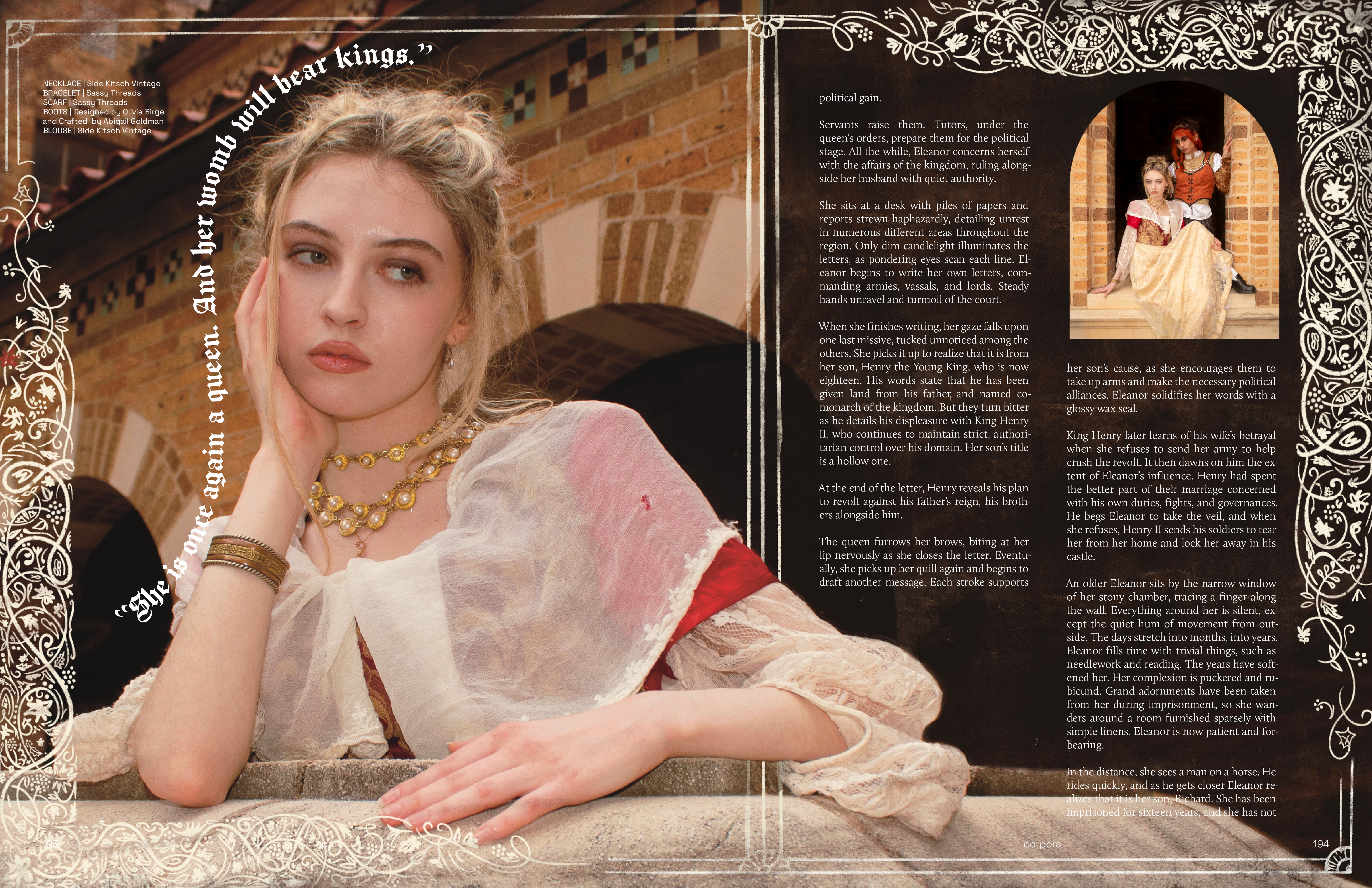AQUITAINE
By Katherine Page
May 3, 2025




May she have a man who will suffer her to be a queen.
A young girl stands alone in the cavernous, candlelit hallway of her family’s estate, tracing her finger along the cold stone wall. In the next room, voices hum and echo incoherently through the halls. The girl does not realize they are speaking of her. She does not know that their presence marks an absence and that the Duchy of Aquitaine has just lost its Duke. The men speak in stern and solemn tones, but they are not mourning a father. Rather, they are discussing the future of his daughter and the domain that she is set to inherit.
Eleanor of Aquitaine was gracile when she inherited her father’s title at eleven. Now she is fifteen. Her skin is pale, flushed, and embellished by the soft lines left by her corset. Her thin frame drowns in the fabric of her bilaut and dainty wrists peek out from heavy sleeves. Eleanor is prepubescent. Unripened. Puerile. Her body is becoming a commodity set to be passed into the hands of those who see Eleanor only as a vessel for power and fortune. One of these men is the King of France, who seeks to add Aquitaine to his kingdom and thus asks for Eleanor’s hand in marriage. Thrust into the suffocating, polished sphere of Louis VII, any vestige of her youth starts to unravel.
Her new life with Louis began poorly. Eleanor suffers a miscarriage only a year into marriage. She isn’t able to get pregnant again for another seven.
Consequently, rumors about her spread. Her reputation is pierced with accusations of infertility, infidelity, and even consanguinity. She is accused of harboring dark powers. “Melusine reborn,” whispers some. Cardinals, abbotts, and legates flit around her husband’s court, urging Eleanor to stay under God’s light so that she may give birth to a son, attributing her misfortune to her own moral failing.
Luckily, after ten years, Eleanor manages to fall pregnant. Unluckily, the process of childbirth is brutal and risky. There is a high risk of infection, descensus, eclampsia, and death. Trapped in a dark room, surrounded by midwives, Eleanor is moved, poked, and prodded. One hand clings to rope as she tries to hold herself up. The other palms the birthing girdle under her chemise, a measly piece of silk embellished with prayers and blessings. It does nothing to end the torment as another wave of pain crashes through her.
Eleanor gives birth to a healthy child. But — much to the chagrin of her husband and his retinue — it is a girl. Five years later, she delivers another one.
The queen likely only held them once before they were taken to be raised and fed by servants and wet nurses. The love that Eleanor was growing for the girls is almost certainly cut short, while whispers of her inability to produce a legitimate heir follow her around like a bad stench. Unsurprisingly, the court advises King Louis to annul his marriage.
During the interim between marriage and pregnancy, however, Eleanor had begun to test the boundaries of her power. Despite the calumny, she practiced boldly voicing her thoughts to the very advisors who had insulted her. With a deafening sharpness Eleanor tells them what she thinks of their politics, and when they react with shock and anger, the queen cries.
“Forgive me,” she would say, daintily wiping her tears away. “I have forgotten myself, as I am unable to become pregnant.” Thus the men forgive her pityingly, unaware of the seeds she is sowing in their minds.
When Eleanor hears of the annulment, her response is quick. Her confidence in her practiced power already taking root. She will not be rapuit et abduxit.
Only six weeks after leaving Louis, Eleanor of Aquitaine is married to King Henry II of England. She has already peeled herself from her ex-husband like shedded skin, and she has dispassionately left her daughters in their kingdom. Eleanor will never see them again.
Her spine is a pillar of strength, her shoulder blades are sharp, and her hands are stable. Her figure is plump yet controlled, fecund and svelte. It is draped in a gown of rich velvet. Deep crimson clings to supple skin, with embellishment that mark her newest riches. Long auburn hair is braided neatly into her veil. Eleanor’s lithe neck holds the weight of the British crown. Yet, her lips are pressed into a firm, stern line, eyes ablaze with determination.
She is once again a queen, and now her womb will bear kings.
Eleanor's first children, Henry, and Richard, are born quickly after the wedding, followed by five more in the years to come. Each pregnancy is less painful than the last, and Eleanor meticulously collects pawns for her political gain. Servants raise them, and tutors, under the queen’s orders, prepare them for the political stage. All the while Eleanor concerns herself with the affairs of the kingdom, ruling alongside her husband with quiet authority.
She sits at a desk with piles of papers and reports are strewn haphazardly, detailing unrest in numerous different areas throughout the region. Only dim candle light illuminates the letters, as pondering eyes scan each line. Eleanor begins to write her own, commanding armies, vassals, and lords. Steady hands unravel the turmoil of the court.
When she finishes writing, her gaze falls upon one last missive, tucked unnoticed among the others. She picks it up to realize that it is from her son, Henry the Young King, who is now eighteen. His words state that he has been given land from his father and named co-monarch of the kingdom. But they turn bitter as he details his displeasure with King Henry II, who continues to maintain strict, authoritarian control over his domain. Her son’s title is a hollow one.
At the end of the letter, Henry reveals his plan to revolt against his father’s reign, his brothers alongside him.
The queen furrows her brows, biting at her lip nervously as she closes the letter. Eventually, she picks up her quill again and begins to draft another message. Each stroke writes support for her son’s cause, as she encourages them to take up arms and make the necessary political alliances. Eleanor solidifies her words with a glossy wax seal.
King Henry later learns of his wife’s betrayal when she refuses to send her army to help crush the revolt. It dawns on him the extent of Eleanor’s influence. Henry had spent the better part of their marriage concerned with his own duties, fights, and governances. He begs Eleanor to take the veil, and when she refuses, Henry sends his soldiers to tear her from her home and lock her away in his castle.
An older Eleanor sits by the narrow window of her stony chamber, tracing a finger along the wall. Everything around her is silent, except the quiet hum of movement from outside. The days stretch into months, into years, as Eleanor fills time with trivial things. Needlework. Reading. The years have softened her. Her complexion is puckered and rubicund. Grande adornments have been taken from her during imprisonment, and she wanders around the sparsely furnished room with simple linens. Eleanor is now patient and forbearing.
In the distance, she sees a man on a horse. He rides quickly, and as he gets closer Eleanor realizes that it is her son, Richard. She has been imprisoned for sixteen years, and she has not seen or heard from him the entire time. When he arrives at the castle, he tells her that her husband and her eldest son are dead.
“I have taken the crown,” he says.
They embrace, and Richard cries, lauding over how much time has passed. Eleanor’s body has changed beyond recognition. Her hair is gray and her back is slightly hunched.
Despite the frailty of her body, Eleanor is more powerful than ever before. Richard has given almost all of his dominion to his mother, trusting her to guide it with wise hands. She rules as regent while Richard the Lionheart stays overseas, fighting wars and gaining land. She manages finance and alliance building, and quells any potential revolt.
She spends the rest of her life on a throne, ornamented with lush regal gowns and jewelry. She sits in red and gold, with a sparkling and heavy crown on her head, a sovereign sceptre in her hands. Despite her age, she holds the weight with dignity. Eleanor has reached this point through drudgery and backbreaking work by stretching her body to the limit. She exhausted her womb, and the extensions of her womb. She defied those who sought to police her. Eleanor of Aquitaine has reached the highest form of power that a woman in her time can reach.
She is king and she dies as king.
Eleanor rests now, next to the very husband who sought to keep her imprisoned. Her gisant is slim and elegant. A crown and a veil enrich her visage. Unlike her husband, Eleanor sits upwards. She is physically above him. Even in death, she has made herself unbeholden to him. ■
Layout: Sarah David
Photographer: Sofia Alvarez
Videographer: HDat Ha & Sienna Madrigal
Stylists: Olivia Birge & Patsy Torres
HMUA: Ziada Araya
Models: Amari Herrera & Victoria Hales
Other Stories in Corpora
© 2025 SPARK. All Rights Reserved.
